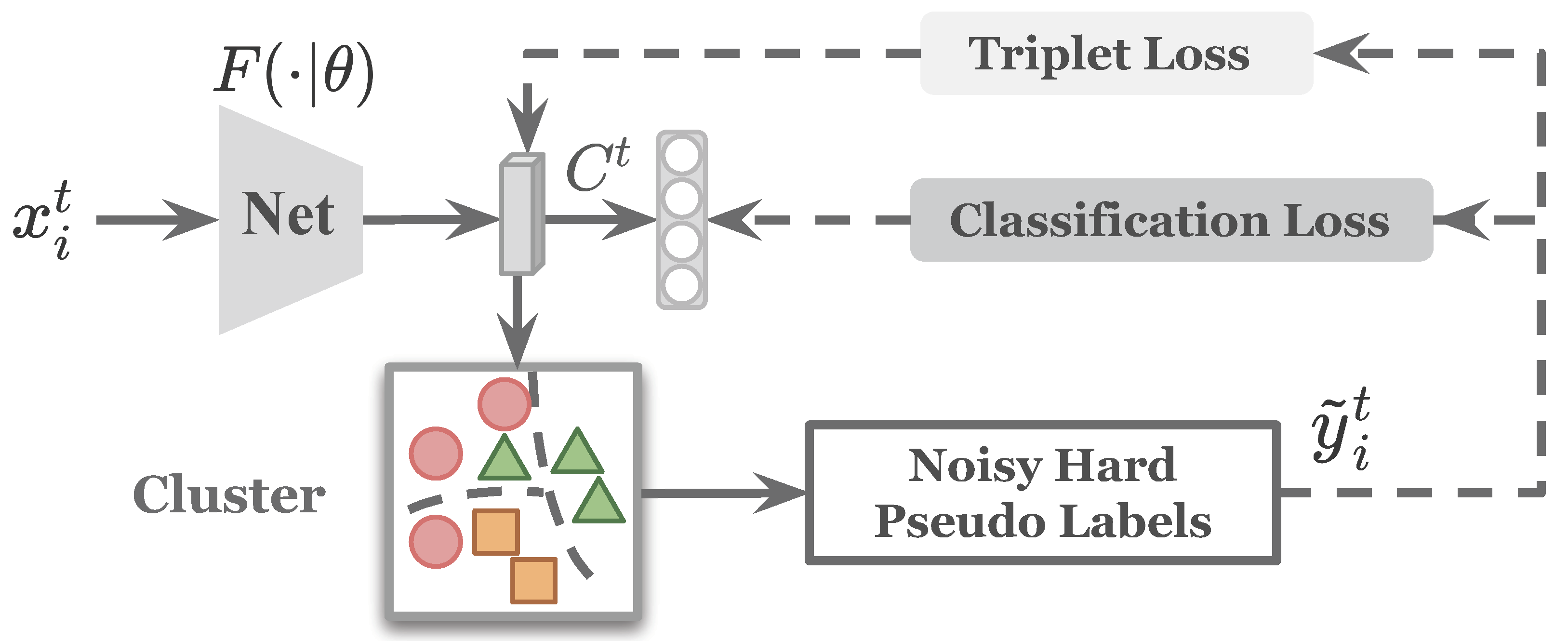yxgeee / Mmt
Programming Languages
Projects that are alternatives of or similar to Mmt
Mutual Mean-Teaching (MMT)
The official implementation for the Mutual Mean-Teaching: Pseudo Label Refinery for Unsupervised Domain Adaptation on Person Re-identification which is accepted by ICLR-2020.
What's New
[Jul 1st, 2020]
- We did the code refactoring to support distributed training and more features. Please see OpenUnReID.
[Mar 27th, 2020]
- We wrote a Chinese blog about this paper at [Zhihu].
[Mar 20th, 2020]
- We supported DBSCAN-based MMT which could achieve better performance. Note that we effectively accelerated the Jaccard distance computing process for DBSCAN (around 200s for CPU and 60s for GPU, compared to around 10min in other repos).
- We added the general clustering-based baseline training for UDA re-ID, i.e. single model training with only hard pseudo labels.
- We slightly modified the setting of training iterations
--itersfrom800to400in the training scripts, achieving similar performance with less time cost. - We discovered a minor hint, changing the setting of
--dropoutfrom0to0.5will achieve supervising improvements in MMT. Intuitively, the dual models are more de-coupled with independent dropout functions. - A reminder here, changing the hyper-parameter
--soft-tri-weight 0.8to--soft-tri-weight 1.0may achieve better performance in some cases. Please refer to ablation study results in Table 2 in our paper.
Installation
git clone https://github.com/yxgeee/MMT.git
cd MMT
python setup.py install
Prepare Datasets
cd examples && mkdir data
Download the raw datasets DukeMTMC-reID, Market-1501, MSMT17, and then unzip them under the directory like
MMT/examples/data
├── dukemtmc
│ └── DukeMTMC-reID
├── market1501
│ └── Market-1501-v15.09.15
└── msmt17
└── MSMT17_V1
Prepare Pre-trained Models
When training with the backbone of IBN-ResNet-50, you need to download the ImageNet pre-trained model from this link and save it under the path of logs/pretrained/.
mkdir logs && cd logs
mkdir pretrained
The file tree should be
MMT/logs
└── pretrained
└── resnet50_ibn_a.pth.tar
Example #1:
Transferring from DukeMTMC-reID to Market-1501 on the backbone of ResNet-50, i.e. Duke-to-Market (ResNet-50).
Train
We utilize 4 GTX-1080TI GPUs for training.
An explanation about the number of GPUs and the size of mini-batches:
- We adopted 4 GPUs with a batch size of 64, since we found 16 images out of 4 identities in a mini-batch benefits the learning of BN layers, achieving optimal performance. This setting may affect IBN-ResNet-50 in a larger extent.
- It is fine to try other hyper-parameters, i.e. GPUs and batch sizes. I recommend to remain a mini-batch of 16 images for the BN layers, e.g. use a batch size of 32 for 2 GPUs training, etc.
Stage I: Pre-training on the source domain
sh scripts/pretrain.sh dukemtmc market1501 resnet50 1
sh scripts/pretrain.sh dukemtmc market1501 resnet50 2
Stage II: End-to-end training with MMT-500
We utilized K-Means clustering algorithm in the paper.
sh scripts/train_mmt_kmeans.sh dukemtmc market1501 resnet50 500
We supported DBSCAN clustering algorithm currently.
Note that you could add --rr-gpu in the training scripts for faster clustering but requiring more GPU memory.
sh scripts/train_mmt_dbscan.sh dukemtmc market1501 resnet50
Test
We utilize 1 GTX-1080TI GPU for testing. Test the trained model with best performance by
sh scripts/test.sh market1501 resnet50 logs/dukemtmcTOmarket1501/resnet50-MMT-500/model_best.pth.tar
Other Examples:
Duke-to-Market (IBN-ResNet-50)
# pre-training on the source domain
sh scripts/pretrain.sh dukemtmc market1501 resnet_ibn50a 1
sh scripts/pretrain.sh dukemtmc market1501 resnet_ibn50a 2
# end-to-end training with MMT-500
sh scripts/train_mmt_kmeans.sh dukemtmc market1501 resnet_ibn50a 500
# or MMT-700
sh scripts/train_mmt_kmeans.sh dukemtmc market1501 resnet_ibn50a 700
# or MMT-DBSCAN
sh scripts/train_mmt_dbscan.sh dukemtmc market1501 resnet_ibn50a
# testing the best model
sh scripts/test.sh market1501 resnet_ibn50a logs/dukemtmcTOmarket1501/resnet_ibn50a-MMT-500/model_best.pth.tar
sh scripts/test.sh market1501 resnet_ibn50a logs/dukemtmcTOmarket1501/resnet_ibn50a-MMT-700/model_best.pth.tar
sh scripts/test.sh market1501 resnet_ibn50a logs/dukemtmcTOmarket1501/resnet_ibn50a-MMT-DBSCAN/model_best.pth.tar
Duke-to-MSMT (ResNet-50)
# pre-training on the source domain
sh scripts/pretrain.sh dukemtmc msmt17 resnet50 1
sh scripts/pretrain.sh dukemtmc msmt17 resnet50 2
# end-to-end training with MMT-500
sh scripts/train_mmt_kmeans.sh dukemtmc msmt17 resnet50 500
# or MMT-1000
sh scripts/train_mmt_kmeans.sh dukemtmc msmt17 resnet50 1000
# or MMT-DBSCAN
sh scripts/train_mmt_dbscan.sh dukemtmc market1501 resnet50
# testing the best model
sh scripts/test.sh msmt17 resnet50 logs/dukemtmcTOmsmt17/resnet50-MMT-500/model_best.pth.tar
sh scripts/test.sh msmt17 resnet50 logs/dukemtmcTOmsmt17/resnet50-MMT-1000/model_best.pth.tar
sh scripts/test.sh msmt17 resnet50 logs/dukemtmcTOmsmt17/resnet50-MMT-DBSCAN/model_best.pth.tar
General Clustering-based Baseline Training
Note that the baseline mentioned in our paper is slightly different from the general clustering-based baseline:
- For fair comparison in the ablation study, the baseline in our paper utilized the same dual-model framework as our MMT but using only hard pseudo labels (no soft labels and no mean-teachers), i.e. setting
--soft-ce-weight 0 --soft-tri-weight 0 --alpha 0in the training scripts. - The general clustering-based baseline is illustrated as above, which contains only one model. The model is training with a cross-entropy loss and a triplet loss, supervised by hard pseudo labels.
- Although the baseline in our paper adopted dual models that are independently trained with hard losses, the features extracted for clustering are averaged from dual models. It is the only difference from the general clustering-based baseline.
Here, we supported training with the general clustering-based baseline for further academic usage. For example, Duke-to-Market with ResNet-50
# for K-Means
sh scripts/train_baseline_kmeans.sh dukemtmc market1501 resnet50 500
sh scripts/train_baseline_kmeans.sh dukemtmc market1501 resnet50 700
sh scripts/train_baseline_kmeans.sh dukemtmc market1501 resnet50 900
# for DBSCAN
sh scripts/train_baseline_dbscan.sh dukemtmc market1501 resnet50
Download Trained Models
Source-domain pre-trained models and all our MMT models in the paper can be downloaded from the link.

Citation
If you find this code useful for your research, please cite our paper
@inproceedings{
ge2020mutual,
title={Mutual Mean-Teaching: Pseudo Label Refinery for Unsupervised Domain Adaptation on Person Re-identification},
author={Yixiao Ge and Dapeng Chen and Hongsheng Li},
booktitle={International Conference on Learning Representations},
year={2020},
url={https://openreview.net/forum?id=rJlnOhVYPS}
}




